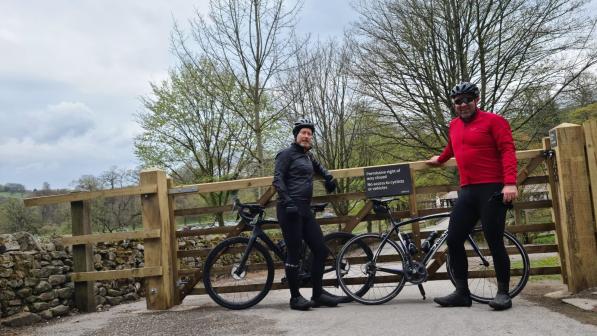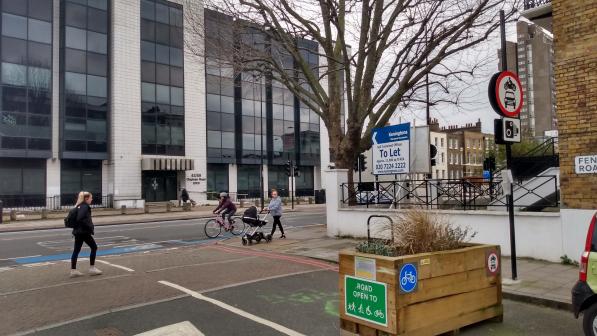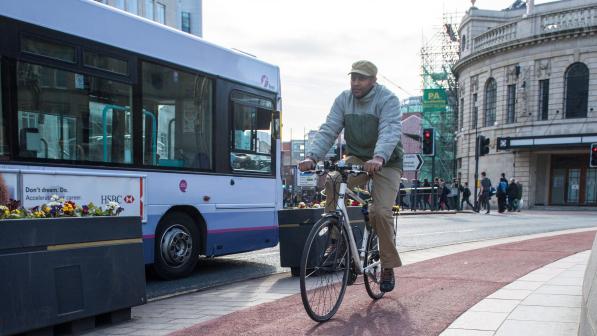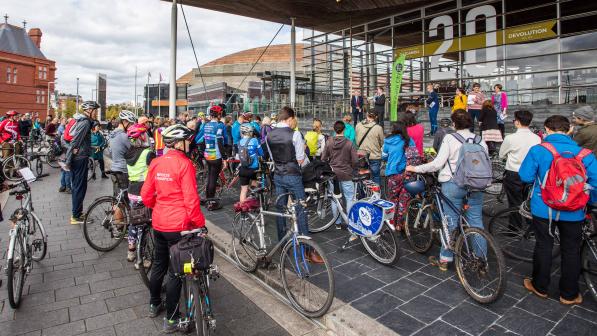What do the local election results mean for cycling in England?

If you’re going to ask a politician to do something, it helps if you can point towards a recent commitment they made: "When you stood for election, you said you’d do this".
Of course, promises don’t guarantee delivery, but they do give you some leverage and a place to start a conversation.
That’s why we either led or supported various campaigns across Britain in the run up to elections on 6 May, giving people the opportunity to ask their candidates to move up the gears and make various pledges to ensure that cycling is accessible to everyone.
Colleagues at Cycling UK have written about what the outcome of elections in Scotland and Wales mean for cycling, and in the absence of elections this year in Northern Ireland, how people can help us challenge the Department for Infrastructure in advance of next year’s elections. In this blog, I’m therefore going to focus entirely on our England election campaign, and the outcomes.
What we asked for
In our frequently asked questions article, I explained that not every local authority in England were holding elections this year, and that with a ‘two tier’ system in some council areas, there were elections in some places where the council doesn’t have responsibility for highways, including investment in cycling and walking.
So, there were elections in 84 councils which do have highways responsibility, and that’s where we targeted our campaigning, asking candidates to support our Manifesto for Cycling and pledge to support two asks to make sure cycling is for everyone, namely:
- The investment needed in active travel to achieve the Government’s 2025 target to double levels of cycling, making active travel a priority in all transport and neighbourhood decision-making.
- The development and delivery of an active travel network of safe, accessible and direct routes, including cycling infrastructure networks designed to national standards in every town and city, and rural routes to link these.
Reaching the candidates
I’ll start with the disappointment. You might imagine that the contact details for candidates in elections are readily available on one website or spreadsheet, but that isn’t the case, and for local elections it’s always more difficult to obtain a complete data set. That was a particular problem this year for the England elections, so we weren’t able to contact many candidates, or enable supporters to do so through our online action.
We’re looking at how to resolve this for future election campaigns, because where we were able to engage with candidates, many of them took the pledge, and signed up to our manifesto asks.
Pedalling politicians
To the numbers and a map. In total, 515 candidates pledged, and of those, 130 were elected. If you click on the map below, you can see if any #pedallingpoliticians made the pledge in your council, and if so, from which party.
Of course, there’s going to be gaps and councils where no politician pledged, but where they did, it’s an opportunity to thank them for doing so, start a conversation, and hold them to account for the commitment they made.
I’ll not go through the results in every authority, but where I live in Kent, eight elected councillors pledged, including independent, liberal democrat, green, labour and conservative party councillors. That’s eight people who can be asked to support active travel initiatives and investment in cycling, whilst being reminded of the commitment they’ve just made.
Mayoral elections
I’ve concentrated on the local election results in this blog, but there were also various mayoral elections last week, including those for combined authority mayors in seven metro mayoral areas.
Cycling UK didn’t lead campaigns in those city regions, because the actions needed to make sure that cycling is for everyone differ between mayoral regions, and we wanted to amplify the voices of those who best understand what needs to happen in their area or region to enable more people to cycle: local cycling campaigns and campaigners.
Our England election page includes a link to a specific Metro Mayoral election page which we’ll be updating next week with information about the outcome of those elections, what the newly elected mayors promised they’d do for cycling and active travel, and how you can engage to make sure they deliver on any active commitments they made.
Police and Crime Commissioner elections
There were also Police and Crime Commissioner (PCC) elections in both England and Wales, with Cycling UK supporting a coalition campaign, led by Action Vision Zero, with a manifesto calling on PCC candidates to :
- Make road danger reduction a priority
- Tackle speeding (the greatest threat)
- Be transparent and accountable
- Work with your community
- Improve the post-crash response.
We’ll be reporting back shortly on the outcome of those elections, and who made what commitments on road danger reduction.
Joining a cycling advocacy movement
It’s easy to take the view that it doesn’t matter what politicians promise before being elected, or that our own voice is unlikely to change much, but when more people ask the same questions of those elected to represent them, and where they join together as a movement, the chances of affecting real change increase substantially.
If you want cycling to be for everyone, we want to support you to link up with others and get your voices heard. We’ve set up the Cycling Advocacy Network to resource and network people like you, so that we can speak up for cycling together. If you’re not sure about your next steps just email us.



